In this article:
Smelly hair can be bad for your self-confidence. Although there can be several reasons behind smelly hair, all of them have one thing in common: scalp buildup.
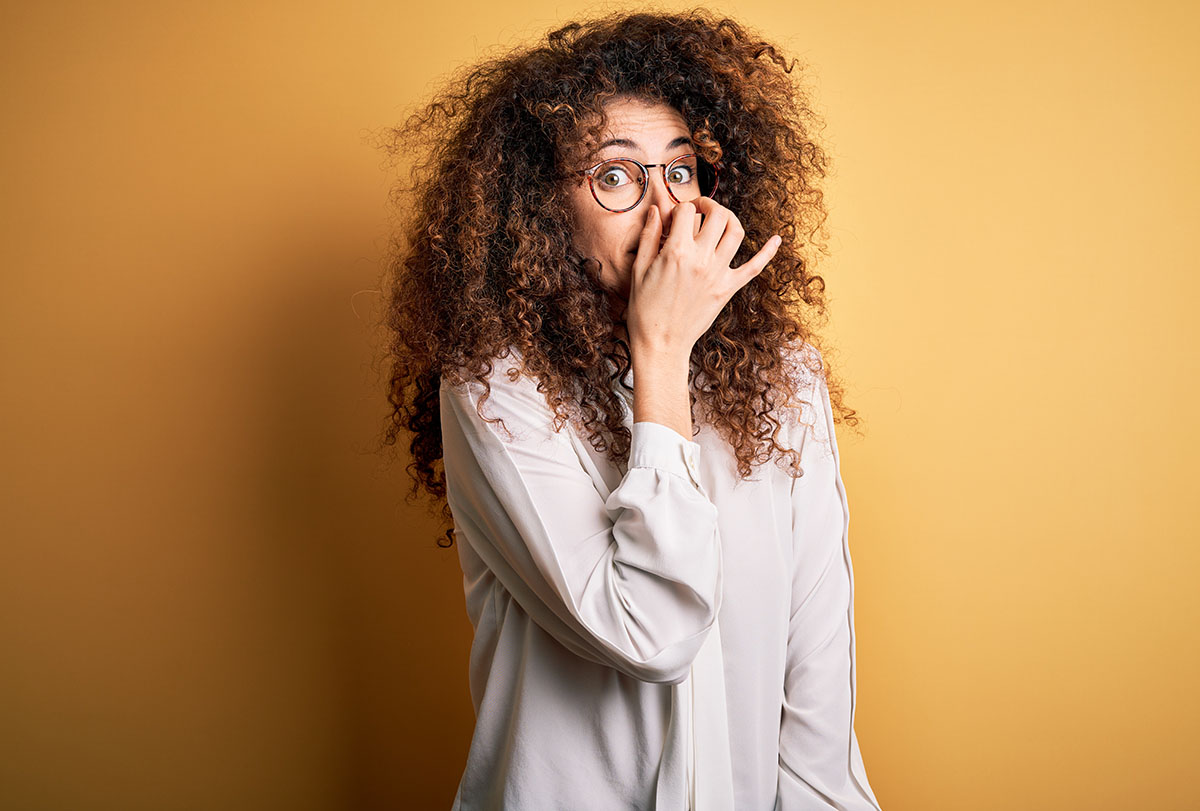
Scalp buildup is exactly what it sounds like: the accumulation of dirt, sebum, dead skin cells, dandruff, hair product residue, and environmental pollutants on the scalp. These impurities serve as food for the microorganisms that naturally reside on the scalp, triggering their rapid proliferation, which leads to scalp infections.
Fortunately, smelly hair syndrome is not something to worry about as it can be easily managed with some simple home remedies and hair care measures, which will be discussed in this article.
Scalp Buildup and Smelly Hair Syndrome
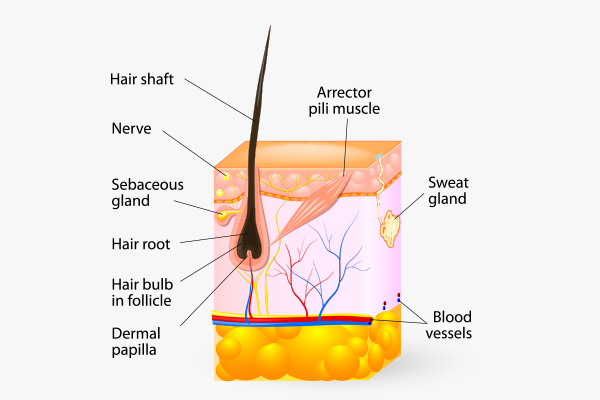
Each hair grows out of a tiny sac called a hair follicle on the scalp. Each hair follicle is attached to a sebaceous gland, which secretes oily lipids that hydrate the scalp and hair.
Overproduction of this sebum can make your scalp and hair excessively greasy. Your scalp naturally sheds dead skin cells, which are trapped in the excess sebum due to its sticky nature.
Oily scalp and hair also attract more dust, grime, and smoke for the same reason. This mix of sebum, dead cells, and dirt provides fodder to various microbes present on the scalp, facilitating their rapid proliferation. These microbes may live normally on the scalp without causing any harm, but their overgrowth can give rise to scalp infections. They feed on the sebum and other organic matter such as dead skin cells by breaking them down, and they release foul-smelling by-products in the process.
Inflammatory skin conditions can make your scalp excessively dry and flaky, worsening the problem. Moreover, poor hair hygiene, such as not washing your hair often enough or properly enough, can also pave the way for scalp buildup. Going without a hair wash for several days will automatically lead to the collection of dirt, oil, and other impurities on your scalp and hair.
Also, negligent hair washing can leave behind residue from shampoos, conditioners, and hair products on your scalp and hair, which add to the buildup. Certain ingredients in hair products, such as silicone, are especially hard to cleanse and cling to your scalp or hair.
Scalp buildup soon leads to foul-smelling hair and scalp, which is called smelly hair syndrome. One important way to tell if you are struggling with this syndrome is that the malodor tends to linger on even after washing. Each hair follicle receives nutrients and oxygen through various blood vessels attached to it. This source of nourishment is very important to sustain hair cell turnover that is needed for hair growth.
Scalp buildup trickles into the hair follicles over time, causing congestion. The clogged hair follicles are unable to receive proper nutrition and eventually shrink. Without proper nutrition, your hair cells will not multiply rapidly enough to make the strand long and strong. The buildup of chemical toxins in the hair follicles can even destroy them to the extent that they can’t produce new hair, and it can sometimes be carcinogenic.
Risk Factors for Smelly Hair Syndrome
The following factors can add to scalp buildup and thereby increase your risk of developing smelly hair syndrome:
- Medical conditions such as seborrheic dermatitis, psoriasis, dermatitis, craniofacial hyperhidrosis (characterized by excessive sweating), and even skin cancer can lead to scalp buildup.
- Hormonal changes, especially during pregnancy or puberty, can increase sebum production (1)(2) in the scalp. Chronic conditions such as polycystic ovary syndrome also cause hormonal imbalances in the body that can overstimulate the sebaceous glands, making the hair and scalp extremely greasy.
- Stress can also hamper the functioning of the hair follicles and thereby can impair overall scalp and hair health.
- Environmental factors such as high humidity that makes you sweat a lot, airborne pollutants, and exposure to chemicals at work can lead to scalp buildup. People with naturally oily scalp collect more of these airborne pollutants on their heads.
- Negligent hair hygiene, such as not washing the hair and scalp properly and frequently enough, is a major contributor to scalp buildup. You must wash your hair thoroughly to remove all the impurities and hair product, but do not overuse hair products or over-rinse as this will only aggravate scalp buildup. Similarly, you are supposed to wash your hair enough times (twice or thrice a week) to prevent any kind of scalp buildup, but not excessively to prevent drying out your scalp and hair even more. Dry scalp tends to be flaky, which can further increase scalp buildup.
- Using hair products with alkaline ingredients can increase the pH of your scalp, making it a very suitable breeding ground for bacteria.
- A poor diet can also deprive your hair follicles of proper nourishment and can dehydrate your scalp.
Diagnosing and Medically Treating Smelly Hair Syndrome
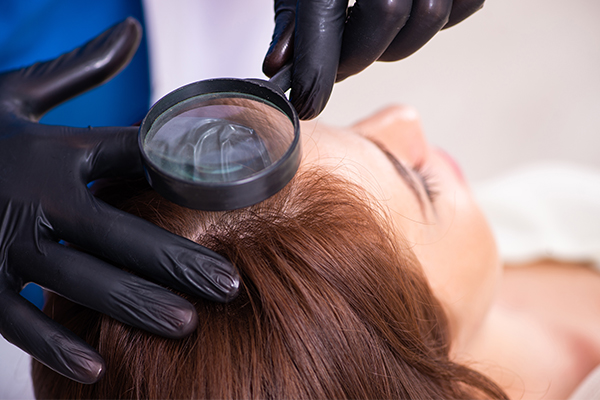
Although there is no specific test to diagnose smelly hair syndrome, there are several ways to identify the root cause of the scalp buildup that leads to stinky hair.
To diagnose the problem, the doctor will assess your medical history and ask the following questions:
- Have you changed your medication lately?
- Does your scalp itch?
- Do you have skin rashes?
- How often do you shampoo?
- What hair products do you use?
- Have you changed your diet recently?
The doctor will then closely examine your hair and scalp and, if needed, order a series of tests, including:
- Dermoscopy
- Swabbing of pustules on the scalp, if any
- Scalp punch biopsy
- Patch testing for allergies
- Blood tests
The medical treatment for smelly hair syndrome will depend upon the diagnosis and severity of scalp inflammation. Your doctor might suggest medicated shampoos or lotions.
If the medical condition causing your smelly hair syndrome lies on the more serious end of the spectrum, such as scalp psoriasis or scarring alopecia, prescription-strength topical products containing salicylic acid, coal tar, or corticosteroids, along with other relevant therapies, will be suggested.
Hair-Care Products for Smelly Hair
Below are a few must-have hair care products that can help manage or treat smelly hair syndrome. These products banish the foul smell from the hair through the specific mechanisms of their key ingredients.
Note that the application of these hair products should be followed by a thorough hair wash to rinse the product out. If you let these products collect on your scalp or hair for a long time, the problem of smelly hair will only worsen.
1. Clarifying shampoos
Several kinds of clarifying shampoos are available over the counter that can deeply cleanse the scalp to get rid of smelly hair.
If your hair is stinky due to dandruff or other scalp infections, go for antifungal shampoos that contain sulfur, zinc pyrithione, ketoconazole, salicylic acid, borax, or selenium sulfide. Some other ingredients to look for in a shampoo to manage smelly hair are:
- Ciclopirox
- Tea tree essential oil
- Peppermint essential oil
- Rosemary essential oil
- Lavender oil
- Vanilla milk
- Papaya extracts
- Raspberry extracts
- Wheat protein
- Almond oil
- Coconut essence
- Strawberry essence
- Mint essence
- Honey
- Cherry extracts
- Apple cider vinegar
2. Conditioners
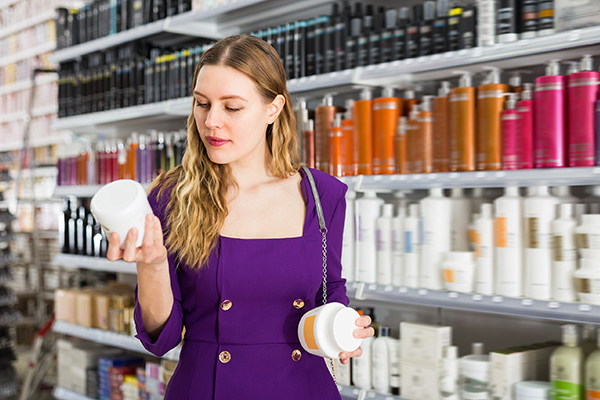
If your smelly hair syndrome is due to excessive sebum production, you can try conditioners that help reduce it to avoid any further scalp buildup.
Many people make the mistake of applying conditioners to the scalp, which only adds to the scalp buildup and clogging of hair follicles. The purpose of a conditioner is to seal the moisture in your hair, so the product should only be applied to the hair shaft but not to the scalp.
Let the conditioner sit on your hair for at least 10–15 minutes before thoroughly rinsing it out, making sure that no residue is left behind.
Look for the following ingredients in a conditioner, which can help remove the extra oil and impart a pleasant smell to your hair:
- Lemongrass oil
- Lemon extracts
- Gooseberry extracts
- Kukui seeds oil
- Potato extracts
- Nettle extract
- Juniper berry extracts
- Mint extracts
- Apple cider vinegar
- Apricot kernel oil
- Sandalwood
- Ubuntu mafura oil
- Ginger extracts
3. Scalp scrubs and exfoliants
Scalp scrubs are slightly more abrasive than simple exfoliating solutions, and they are used to keep the scalp clean and prevent or eliminate scalp buildup.
Exfoliants can be physical (with agents such as sugar granules) or chemical (with agents such as mild acids). If you are struggling with psoriasis, it is best to avoid a scalp scrub and instead use shampoos specifically designed for psoriasis.
Look for the following ingredients in a scalp scrub or exfoliant:
- Kaolin
- Argan oil
- Coconut oil
- Marula oil
- Ecuadorian ivory palm seed powder
- Activated charcoal
- Sugar granules
- Cellulose acetate biodegradable beads
- Probiotic blends
- Alpha hydroxy acids such as glycolic acid
- Beta hydroxy acids such as salicylic acid
4. Hair perfume sprays
Different kinds of perfumed hair sprays that can help mitigate the problem of smelly hair are readily available in drugstores.
Although it may seem counterproductive to use substances that can add to scalp buildup, such is not the case here. You spray the product only on your hair strands and not on your scalp, where the actual buildup occurs.
Look for hair sprays that are made with nourishing natural ingredients, which will make your hair stronger and will also mask the foul smell. Many commercial hair sprays contain alcohol, which can dry out and irritate your scalp and make the problem worse, so avoid them. Lastly, make sure to maintain a proper hair washing routine to rinse out the product at the end of the day.
Some Self-Care Measures for Smelly Hair
Follow these self-care measures to manage smelly hair.
1. Apply DIY hair masks
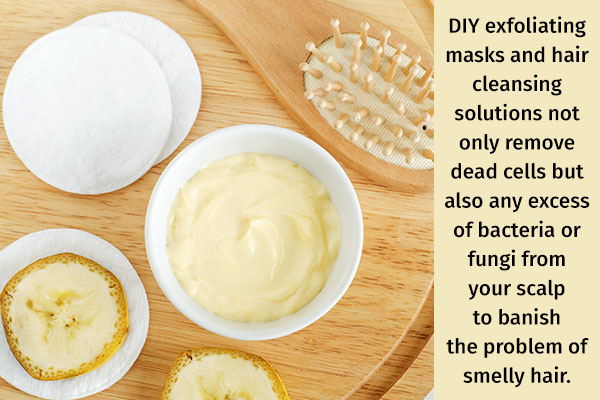
As mentioned above, several commercially prepared hair products can help manage smelly hair syndrome by deeply cleaning any impurities from the scalp and imparting a pleasant smell.
However, commercial hair products can often be quite expensive or contain harsh chemicals that can dry out your scalp and hair with repeated use. The added fragrances in these products also strip away the natural lipids from your scalp, which can make it flaky and will only add to the scalp buildup.
It may be a good idea to introduce certain tried-and-tested home remedies to your hair care regimen, which employ completely natural ingredients to clean, disinfect, and perfume your scalp and hair.
Here are a few DIY exfoliating masks and hair cleansing solutions that remove not only dead cells but also bacteria or fungi from your scalp to banish smelly hair. (3)
Caution: Patch test these masks on the underside of your forearm or your neck before applying them to your scalp to rule out any allergic reactions.
Baking soda rinse:
- Put 1 tablespoon of baking soda (4) in 1 cup of water.
- Add a few drops of your preferred essential oil into the mix.
- Stir all the ingredients well.
Apple cider vinegar rinse:
- Mix 1 part apple cider vinegar (5) and 3 parts water.
- Add 1 tablespoon of lemon juice (6) and a few drops of your preferred essential oil into the solution.
- Mix all the ingredients well.
Neem rinse or mask: (7)
- Boil fresh neem leaves in water and then strain the liquid. Use the neem water as a hair rinse.
- Alternatively, make a paste by mixing neem powder and water, and apply the paste to your scalp and hair.
Yogurt mask:
- Apply yogurt directly to your scalp and hair like a nourishing mask. (8)
- You can also mix 1–2 tablespoons of oatmeal to it for added scrubbing and moisturizing effect.
Honey and salt scrub:
- Take 1–2 tablespoons of honey in a bowl. (9)
- Add some salt, preferably Himalayan pink salt.
- Add 1 tablespoon of water or apple cider.
- Mix all the ingredients to make a paste.
Avocado oil and sugar scrub:
- Put 1 teaspoon of avocado oil in a bowl. (10)
- Add 1 tablespoon of brown sugar and a few drops of tea tree oil.
- Mix all the ingredients well to make a scalp scrub.
Caution: Don’t use strong ingredients such as baking soda and apple cider too often or in undiluted forms on your scalp and hair as they can dehydrate or irritate your scalp and damage the hair strands. Hair remedies with these ingredients should be used only once or twice a week.
How to use:
- Wash your hair and scalp with a proper shampoo and lukewarm or tepid water.
- Slather the hair mask all over your scalp and hair. Let it sit for about 10–15 minutes.
- Rinse it off properly with plain water.
2. Consume a proper diet
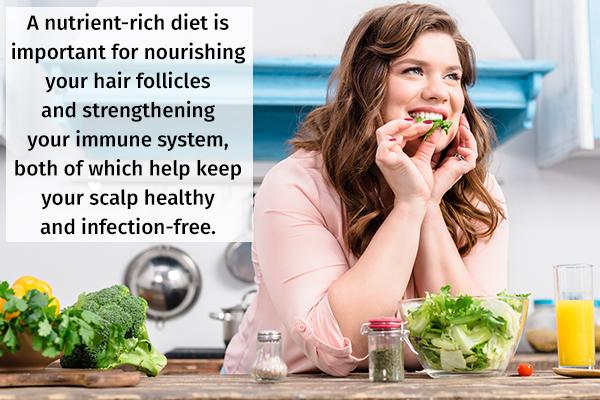
Although there is no direct connection between diet and smelly hair syndrome, the right food choices can help manage inflammatory skin disorders such as psoriasis, which make your scalp dry and flaky and add to the scalp buildup. (11)
Conversely, consuming too much refined sugar or carbs, saturated fats, processed meats, alcohol, and vegetable oils can increase inflammation in the body, making these conditions worse.
You should also avoid foods such as onion, dairy products, and alcohol, which can intensify your sweat odor and make your scalp smell foul too. Moreover, a nutrient-rich diet is important for nourishing your hair follicles and strengthening your immune system, which can help keep your scalp healthy and infection-free.
3. Follow a proper hair care routine
You should plan your hair regimen and choose your hair care products depending on your hair type and the hair problems that you are dealing with. Here are general hair care guidelines that can benefit most people:
- Washing the hair too often is just as bad as not washing them for many days at a stretch. The former can strip the moisture from your hair and scalp to make them excessively dry, while the latter can add to the scalp buildup and clog your hair follicles. The ideal thing to do is to wash your hair no more than twice or thrice a week.
- Choose your hair products wisely. Look for shampoos and conditioners that are devoid of parabens, alcohol, formalin, silicone, and formaldehyde, which are harsh chemicals that can dehydrate or irritate your scalp and damage your hair follicles over time. Shampoos often contain sulfates such as lauryl sulfates or sulfosuccinates that deeply cleanse the scalp but also remove its natural lipids. You can’t do without these sulfate-containing shampoos if you have an excessively oily scalp, but try to limit their use to avoid their adverse side effects. You can use dry shampoos to remove excess grease from your hair, but do not use them for more than 2 consecutive days as they contain alcohol.
- Add scalp exfoliation to your hair care regimen, and do it at least once or twice a week.
- After washing your head, dry it properly using a microfiber towel. Do not leave your head damp as moisture promotes fungi.
- Minimize the use of hairstyling tools such as straighteners, blow-dryers, and curling irons that release a lot of heat, which can dry out your scalp and burn your hair.
- Gently brush your hair daily and keep it detangled using a soft-bristled brush.
Preventing Smelly Hair

Here are some useful tips to minimize scalp buildup and keep your hair from smelling:
- Cover your head with a scarf or cap when going out in a polluted environment. If you are prone to sweating, do not wear your head cover too tightly or for prolonged periods.
- Wash your hair properly after a workout or visiting a polluted place.
- Avoid wearing wigs, and if you do, make sure they are thoroughly clean.
- Don’t touch or play with your hair too much.
- Keep your hairbrushes, towels, pillow covers, hats, and scarves clean to avoid bacterial buildup on your head.
When to See a Doctor
Smelly hair syndrome does not pose a threat to your health, but it can be extremely embarrassing and can lead to complications if left untreated. Depending upon the root cause, the condition can trigger hair loss, folliculitis, excessively dry and flaking scalp, sores, and scarring if not addressed properly.
Fortunately, most cases of smelly hair syndrome can be easily managed at home. Since this condition can also stem from an underlying medical issue, it is advised to keep a track of your recovery when you are attempting to treat it at home. If you do not see any improvement in a week and begin to show additional symptoms, it is best to see a doctor for a complete diagnosis.
Final Word
Smelly hair syndrome can afflict anyone. There are several possible reasons it may happen, but negligent hair hygiene is a prime culprit.
There are plenty of things you can do at home to treat and prevent scalp buildup, but it is important to visit a dermatologist if your condition persists or worsens despite all the necessary hair care. The same is true if the condition becomes recurrent or is accompanied by additional symptoms, which could be a sign of a more serious underlying problem.
- Was this article helpful?
- YES, THANKS!NOT REALLY


